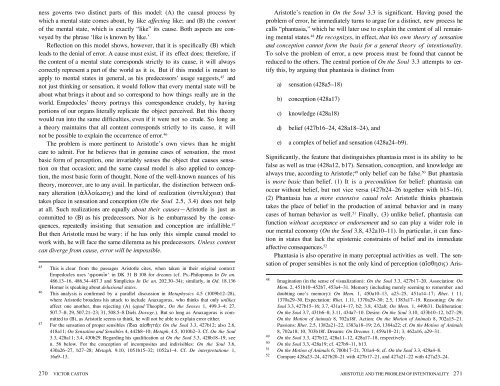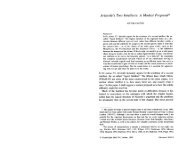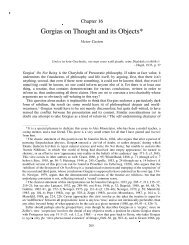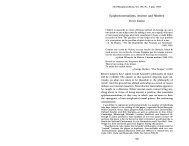Aristotle and the Problem of Intentionality. - Ancient Philosophy ...
Aristotle and the Problem of Intentionality. - Ancient Philosophy ...
Aristotle and the Problem of Intentionality. - Ancient Philosophy ...
Create successful ePaper yourself
Turn your PDF publications into a flip-book with our unique Google optimized e-Paper software.
ness governs two distinct parts <strong>of</strong> this model: (A) <strong>the</strong> causal process bywhich a mental state comes about, by like affecting like; <strong>and</strong> (B) <strong>the</strong> content<strong>of</strong> <strong>the</strong> mental state, which is exactly “like” its cause. Both aspects are conveyedby <strong>the</strong> phrase ‘like is known by like.’Reflection on this model shows, however, that it is specifically (B) whichleads to <strong>the</strong> denial <strong>of</strong> error. A cause must exist, if its effect does; <strong>the</strong>refore, if<strong>the</strong> content <strong>of</strong> a mental state corresponds strictly to its cause, it will alwayscorrectly represent a part <strong>of</strong> <strong>the</strong> world as it is. But if this model is meant toapply to mental states in general, as his predecessors’ usage suggests, 45 <strong>and</strong>not just thinking or sensation, it would follow that every mental state will beabout what brings it about <strong>and</strong> so correspond to how things really are in <strong>the</strong>world. Empedocles’ <strong>the</strong>ory portrays this correspondence crudely, by havingportions <strong>of</strong> our organs literally replicate <strong>the</strong> object perceived. But this <strong>the</strong>orywould run into <strong>the</strong> same difficulties, even if it were not so crude. So long asa <strong>the</strong>ory maintains that all content corresponds strictly to its cause, it willnot be possible to explain <strong>the</strong> occurrence <strong>of</strong> error. 46The problem is more pertinent to <strong>Aristotle</strong>’s own views than he mightcare to admit. For he believes that in genuine cases <strong>of</strong> sensation, <strong>the</strong> mostbasic form <strong>of</strong> perception, one invariably senses <strong>the</strong> object that causes sensationon that occasion; <strong>and</strong> <strong>the</strong> same causal model is also applied to conception,<strong>the</strong> most basic form <strong>of</strong> thought. None <strong>of</strong> <strong>the</strong> well-known nuances <strong>of</strong> his<strong>the</strong>ory, moreover, are to any avail. In particular, <strong>the</strong> distinction between ordinaryalteration (éllo¤vsiw) <strong>and</strong> <strong>the</strong> kind <strong>of</strong> realization (§ntel°xeia) thattakes place in sensation <strong>and</strong> conception (On <strong>the</strong> Soul 2.5, 3.4) does not helpat all. Such realizations are equally about <strong>the</strong>ir causes—<strong>Aristotle</strong> is just ascommitted to (B) as his predecessors. Nor is he embarrassed by <strong>the</strong> consequences,repeatedly insisting that sensation <strong>and</strong> conception are infallible. 47But <strong>the</strong>n <strong>Aristotle</strong> must be wary: if he has only this simple causal model towork with, he will face <strong>the</strong> same dilemma as his predecessors. Unless contentcan diverge from cause, error will be impossible.45 This is clear from <strong>the</strong> passages <strong>Aristotle</strong> cites, when taken in <strong>the</strong>ir original context:Empedocles uses ‘frone›n’ in DK 31 B 108 for dreams (cf. Ps.-Philoponus In De an.486.13–16, 486.34–487.3 <strong>and</strong> Simplicius In De an. 202.30–34); similarly, in Od. 18.136Homer is speaking about delusional states.46 This analysis is confirmed by a parallel discussion in Metaphysics 4.5 (1009b12–28),where <strong>Aristotle</strong> broadens his attack to include Anaxagoras, who thinks that only unlikesaffect one ano<strong>the</strong>r, thus rejecting (A) (apud Theophr., On <strong>the</strong> Senses 1, 499.3–4; 27,507.7–8; 29, 507.21–23; 31, 508.5–8 Diels Doxogr.). But so long as Anaxagoras is committedto (B), as <strong>Aristotle</strong> seems to think, he will not be able to explain error ei<strong>the</strong>r.47 For <strong>the</strong> sensation <strong>of</strong> proper sensibles (‡dia afisyhtã): On <strong>the</strong> Soul 3.3, 427b12; also 2.6,418a11; On Sensation <strong>and</strong> Sensibles 4, 442b8–10; Metaph. 4.5, 1010b2–3. Cf. On <strong>the</strong> Soul3.3, 428a11; 3.4, 430b29. Regarding his qualification at On <strong>the</strong> Soul 3.3, 428b18–19, seen. 56 below. For <strong>the</strong> conception <strong>of</strong> incomposites <strong>and</strong> indivisibles: On <strong>the</strong> Soul 3.6,430a26–27, b27–28; Metaph. 9.10, 1051b15–32; 1052a1–4. Cf. De interpretatione 1,16a9–13.<strong>Aristotle</strong>’s reaction in On <strong>the</strong> Soul 3.3 is significant. Having posed <strong>the</strong>problem <strong>of</strong> error, he immediately turns to argue for a distinct, new process hecalls “phantasia,” which he will later use to explain <strong>the</strong> content <strong>of</strong> all remainingmental states. 48 He recognizes, in effect, that his own <strong>the</strong>ory <strong>of</strong> sensation<strong>and</strong> conception cannot form <strong>the</strong> basis for a general <strong>the</strong>ory <strong>of</strong> intentionality.To solve <strong>the</strong> problem <strong>of</strong> error, a new process must be found that cannot bereduced to <strong>the</strong> o<strong>the</strong>rs. The central portion <strong>of</strong> On <strong>the</strong> Soul 3.3 attempts to certifythis, by arguing that phantasia is distinct froma) sensation (428a5–18)b) conception (428a17)c) knowledge (428a18)d) belief (427b16–24, 428a18–24), <strong>and</strong>e) a complex <strong>of</strong> belief <strong>and</strong> sensation (428a24–b9).Significantly, <strong>the</strong> feature that distinguishes phantasia most is its ability to befalse as well as true (428a12, b17). Sensation, conception, <strong>and</strong> knowledge arealways true, according to <strong>Aristotle</strong>; 49 only belief can be false. 50 But phantasiais more basic than belief. (1) It is a precondition for belief: phantasia canoccur without belief, but not vice versa (427b24–26 toge<strong>the</strong>r with b15–16).(2) Phantasia has a more extensive causal role: <strong>Aristotle</strong> thinks phantasiatakes <strong>the</strong> place <strong>of</strong> belief in <strong>the</strong> production <strong>of</strong> animal behavior <strong>and</strong> in manycases <strong>of</strong> human behavior as well. 51 Finally, (3) unlike belief, phantasia canfunction without acceptance or endorsement <strong>and</strong> so can play a wider role inour mental economy (On <strong>the</strong> Soul 3.8, 432a10–11). In particular, it can functionin states that lack <strong>the</strong> epistemic constraints <strong>of</strong> belief <strong>and</strong> its immediateaffective consequences. 52Phantasia is also operative in many perceptual activities as well. The sensation<strong>of</strong> proper sensibles is not <strong>the</strong> only kind <strong>of</strong> perception (a‡syhsiw) Aris-48 Imagination (in <strong>the</strong> sense <strong>of</strong> visualization): On <strong>the</strong> Soul 3.3, 427b17–20. Association: OnMem. 2, 451b10–452b7, 453a4–31. Memory (including merely seeming to remember <strong>and</strong>doubting one’s memory): On Mem. 1, 450a10–13, a23–25, 451a14–17; Rhet. I 11,1370a29–30. Expectation: Rhet. 1.11, 1370a29–30; 2.5, 1383a17–19. Reasoning: On <strong>the</strong>Soul 3.3, 427b15–16; 3.7, 431a14–17, b2; 3.8, 432a8; On Mem. 1, 449b31. Deliberation:On <strong>the</strong> Soul 3.7, 431b6–8; 3.11, 434a7–10. Desire: On <strong>the</strong> Soul 3.10, 433b10–12, b27–29;On <strong>the</strong> Motion <strong>of</strong> Animals 8, 702a18f. Action: On <strong>the</strong> Motion <strong>of</strong> Animals 8, 702a15–21.Passions: Rhet. 2.5, 1382a21–22, 1383a18–19; 2.6, 1384a22; cf. On <strong>the</strong> Motion <strong>of</strong> Animals8, 702a18; 10, 703b18f. Dreams: On Dreams 1, 459a18–21; 3, 462a16, a29–31.49 On <strong>the</strong> Soul 3.3, 427b12, 428a11–12, 428a17–18, respectively.50 On <strong>the</strong> Soul 3.3, 428a19; cf. 427b9–11, b13.51 On <strong>the</strong> Motion <strong>of</strong> Animals 6, 700b17–21, 701a4–6; cf. On <strong>the</strong> Soul 3.3, 429a4–8.52 Compare 428a23–24, 427b20–21 with 427b17–21, <strong>and</strong> 427a21–22 with 427a23–24.270 VICTOR CASTONARISTOTLE AND THE PROBLEM OF INTENTIONALITY 271





